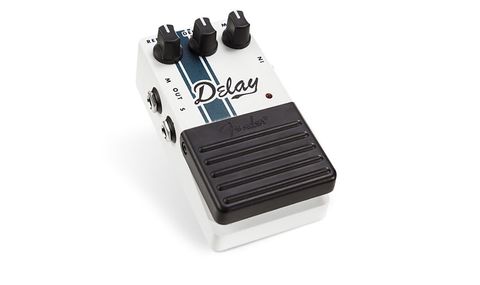Launching as part of the new Competition series, the Fender Delay aims to rival entry-level delay pedals from the likes of Boss and Digitech.
Fender isn't really known for its effects pedals. Sure, there have been some in the past, such as the Blender fuzz, and there were a bunch of re-issues that we reviewed in 2008, but they were all one-offs and nothing like this new homogenous range.
"If you connect another jack you get dry signal at the mono output with the repeats delivered from the stereo output"
Where previous Fender pedals have eaten up floor space, the Competition Series is 'board- friendly with a similar footprint to Boss compacts, and competitively priced - under £50 at many retailers.
Mono or stereo, the Delay outputs a mix of the dry signal and the repeats through its mono output, but if you connect another jack you get dry signal at the mono output with the repeats delivered from the stereo output.
The mix knob gradually turns up the level of the repeats to their maximum, which is equal to the dry signal volume, while the repeat knob goes from a single repeat upwards. Maximum delay time at 300ms isn't massive compared to some pedals on the market, but it is broadly on a par with vintage analogue delays such as the Boss DM-2.
The knob's travel offers plenty of options to dial in shorter delay times creating effects from bathtub reverb through 50s slapback, to the longer multiple repeats that sit behind your solos for a more epic sound.
Repeats might not decay in the way an analogue delay does, but this still provides a pleasantly warm sound that blends in nicely with your guitar tone.

